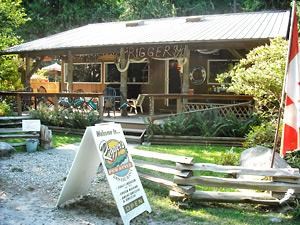Parliamentary Secretary John Yap’s recent liquor policy review comes on the heels of what for one Savary Island businessman has been a nightmare of bureaucratic red tape where the BC Liquor Distribution Board is concerned.
Bruce Brown, owner of Savary Island General Store and Trading Company and Rigger’s Pub, first applied for an RAS (rural agency store) licence to sell alcohol in his general store approximately 20 years ago. After five attempts and another handful by the Powell River Regional District, he is still waiting.
“At the outset, criteria was in place that disqualified Savary,” said Brown. “This included a requirement for 350 full-time permanent residents and community indicators such as a church and a school. In 2012, the criteria were changed to accommodate rural communities and resort towns.”
To his relief, Savary seemed to fit the new requirements. It served a trading area of more than 200 persons and had shown its economic viability by being in business for more than 20 years. “But,” Brown said, “the application was still refused, this time on grounds that the proposed location was fewer than 10 kilometres from the nearest rural agency store—at the Lund Hotel.”
Electoral Area A Director Patrick Brabazon discussed the matter with Suzanne Anton, BC attorney general, at the annual UBCM (Union of BC Municipalities) conference in September. Anton replied in a letter on October 7 that she would advise the liquor board take a second look at the possibility of authorizing an RAS on Savary. After honouring her request, the liquor board again stated it would hold to the original judgment.
The regional district continues to support Brown and is “pursuing the initiative on the basis of fairness and parity,” said Al Radke, chief administrative officer.
In a letter addressed to the regional district dated October 17, Blaine Lawson, general manager of the Liquor Distribution Branch (LDB), wrote that the RAS guidelines are in fact not clear on how the distance requirement applies to water-bound locations, but that it is the agency’s practice to apply the 10-kilometre minimum distance requirement to water-bound locations “as the crow flies.”
Radke said the regional district respectfully takes exception to those comments, citing the LDB’s own document, the Rural Agency Store Program Information Package, revised April 28, 2013. The program states that a rural community is 10 kilometres’ driving distance from the nearest existing GLS (government liquor store), or RAS, where access is by all-weather road. “The population on Savary falls within the minimum of 200 persons—too small to warrant the establishment of a GLS,” Radke wrote in an email to the Peak.
As well, Radke continued, under Section II, Community and Business Criteria, the very same language is used on two separate occasions. “One could argue that the exception for communities without all-weather road access speaks directly to water-bound communities.” Radke wrote that to adopt a policy “as the crow flies” is arbitrary and invalid due to the use of discretion, which is not an option in policy. There are also examples where this need for discretion has been overlooked.
One example is the Texada Market located in Van Anda on Texada Island. It is approximately 5.6 kilometres from the Beach Gardens Resort and Marina in Powell River “as the crow flies” across the Salish Sea, yet it is still authorized to purchase and sell liquor.
The issue is about safety as well, Brown said. “The last thing you want is for people who have been drinking to jump into their boats to go re-stock after they’ve run out of alcohol. We’re just not sure what the hang-up is.”
At the November 28 regional board meeting, directors passed a motion to send another letter to the attorney general, with a copy to the LDB, indicating that “they are in violation of their own guidelines as they have issued a liquor licence to other islands within 10 kilometres of another licensed establishment.”
As the crow flies...



